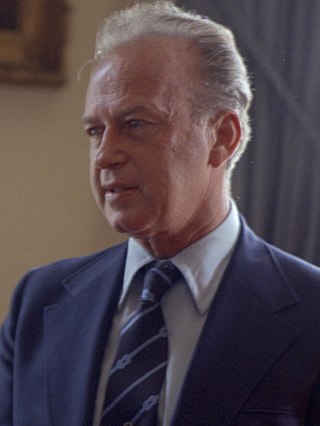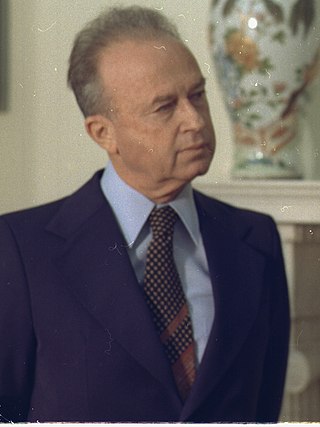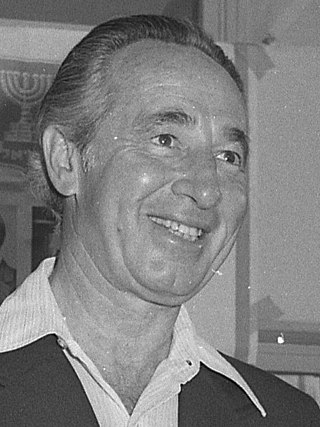
The prime minister of Israel is the head of government and chief executive of the State of Israel.

Yitzhak Rabin was an Israeli politician, statesman and general. He was the fifth prime minister of Israel, serving two terms in office, 1974–1977, and from 1992 until his assassination in 1995.

Shimon Peres was an Israeli politician and statesman who served as the eighth prime minister of Israel from 1984 to 1986 and from 1995 to 1996 and as the ninth president of Israel from 2007 to 2014. He was a member of twelve cabinets and represented five political parties in a political career spanning 70 years. Peres was elected to the Knesset in November 1959 and except for three months out of office in early 2006, served as a member of the Knesset continuously until he was elected president in 2007. Serving in the Knesset for 48 years, Peres is the longest serving member in the Knesset's history. At the time of his retirement from politics in 2014, he was the world's oldest head of state and was considered the last link to Israel's founding generation.
Legislative elections were held in Israel on 17 May 1977 to elect the ninth Knesset. For the first time in Israeli political history, the right wing, led by Likud, won a plurality of seats, ending almost 30 years of rule by the left-wing Alignment and its predecessor, Mapai. The dramatic shift in Israeli politics caused by the outcome led to it becoming known as "the revolution", a phrase coined by TV anchor Haim Yavin when he announced the election results live on television with the words "Ladies and gentlemen—a revolution!". The election saw the beginning of a period lasting almost two decades where the left- and right-wing blocs held roughly equal numbers of seats in the Knesset.
The Alignment was the name of two political alliances in Israel, both of which ended their existence by merging, in January 1968 and October 1991, into the Israeli Labor Party.
Legislative elections were held in Israel on 30 June 1981 to elect the 120 members of the Knesset. The ruling Likud won one more seat than the opposition Alignment, in line with many polls which had predicted a tight race. Voter turnout was 78.5%, with Likud receiving around ten thousand more than the Alignment. This elections highlighted the polarization in the country.
Legislative elections were held in Israel on 23 July 1984 to elect the eleventh Knesset. Voter turnout was 78.8%. The results saw the Alignment return to being the largest party in the Knesset, a status it had lost in 1977. However, the party could not form a government with any of the smaller parties, resulting in a grand coalition government with Likud, with both party leaders, Shimon Peres and Yitzhak Shamir, holding the post of Prime Minister for two years each.
Elections for the 13th Knesset were held in Israel on 23 June 1992. The election resulted in the formation of a Labor government, led by Yitzhak Rabin, helped by the failure of several small right wing parties to pass the electoral threshold. Voter turnout was 77%.
General elections were held in Israel on 29 May 1996. For the first time, the prime minister was elected on a separate ballot from the remaining members of the Knesset.

The dirty trick was a political scandal that occurred in Israel in 1990. It referred to an attempt by Shimon Peres to form a government made up of the left-wing factions and the ultra-orthodox parties. It failed when the ultra-orthodox parties backed out on the deal.

Yisrael Kessar was an Israeli politician who served as a Knesset member for the Alignment and Labor Party between 1984 and 1996.

Ora Namir was an Israeli politician and diplomat who served as a member of the Knesset from 1974 until 1996, as well as holding the posts of Minister of the Environment and Minister of Labour and Social Welfare during the 1990s. She later became the country's ambassador to China and Mongolia.

The twenty-fourth government of Israel was formed by Yitzhak Shamir of Likud on 11 June 1990. This followed the failure of Alignment leader Shimon Peres to form a government, after the Alignment had pulled out of the previous national unity coalition, in an incident which became known as the dirty trick.

The twenty-sixth government of Israel was formed by Shimon Peres of the Labor Party on 22 November 1995, following the assassination of Yitzhak Rabin on 4 November. Peres kept the same coalition as previously, namely the Labor Party, Meretz and Yiud, which together held only 58 of the 120 seats in the Knesset. However, the government was also supported, but not joined, by Hadash and the Arab Democratic Party, which held an additional five seats between them.
The Israeli Labor Party, commonly known as HaAvoda, was a social democratic political party in Israel. The party was established in 1968 by a merger of Mapai, Ahdut HaAvoda and Rafi. Until 1977, all Israeli prime ministers were affiliated with the Labor movement. The final party leader was Yair Golan, who was elected on 28 May 2024.

The 1974 Israeli Labor Party leadership election was held on 23 April 1974. It saw the party's central committee elect Yitzhak Rabin to succeed Golda Meir as the party's leader. Rabin defeated Shimon Peres. It was the first of four leadership contests in which Rabin and Peres challenged each other.

The February 1977 Israeli Labor Party leadership election was held on 23 February 1977. It saw the delegates to the party's convention reelect Yitzhak Rabin as the party's leader. Rabin defeated Shimon Peres. It was the second of four leadership contests in which Rabin and Peres faced each other.

The 1980 Israeli Labor Party leadership election was held on 18 December 1980. It saw the delegates to the party's convention reelect Shimon Peres as the party's leader. Peres defeated Yitzhak Rabin.
The 1992 Likud leadership election was held on 20 February 1992 to elect the leader of the Likud party. It saw the members of Likud's Central Committee reelect incumbent leader and prime minister Yitzhak Shamir, who defeated challenges from David Levy and Ariel Sharon














